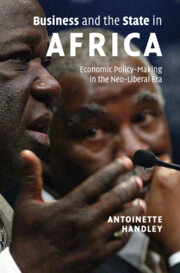Book contents
- Frontmatter
- Contents
- List of figures
- Acknowledgments
- List of abbreviations
- Introduction: the African business class and development
- Part one Institutionalizing constructive contestation
- Part two Business and the neo-patrimonial state
- 4 The emergence of neo-patrimonial business in Ghana, 1850–1989
- 5 State-dominant reform: Ghana in the 1990s and 2000s
- 6 Business and government in Zambia: too close for comfort
- Conclusion: the business of economic policy-making, comparatively speaking
- Bibliography
- Index
4 - The emergence of neo-patrimonial business in Ghana, 1850–1989
Published online by Cambridge University Press: 22 September 2009
- Frontmatter
- Contents
- List of figures
- Acknowledgments
- List of abbreviations
- Introduction: the African business class and development
- Part one Institutionalizing constructive contestation
- Part two Business and the neo-patrimonial state
- 4 The emergence of neo-patrimonial business in Ghana, 1850–1989
- 5 State-dominant reform: Ghana in the 1990s and 2000s
- 6 Business and government in Zambia: too close for comfort
- Conclusion: the business of economic policy-making, comparatively speaking
- Bibliography
- Index
Summary
[In Ghana] a class of African businessmen, supplied with African capital … did not exist. [Instead,] there had arisen the large petty bourgeois stratum … which was able to step into the power vacuum caused by the absence of a true African capitalist class.
In contrast with South Africa and Mauritius, Ghana's economic history has been marked by an unhealthily close relationship between the fraternal worlds of money and power. In what later became south and central Ghana, an ongoing entanglement of political and economic elites was epitomized in the institutions of the pre-colonial Asante empire and colonialism did not necessarily disarticulate these linkages. Following independence, Kwame Nkrumah and the ruling Congress People's Party (CPP) institutionalized the dominance of the political sphere over the economic, consolidating a neo-patrimonial fusion of economic and political elites.
This was not inevitable. Given certain similarities, it is not unthinkable that Ghana's development might have more closely resembled South Africa's: like South Africa, Ghana had a leading sector (cocoa in Ghana's case) which might have provided the basis for the development of an assertive, indigenous economic class. Ultimately, however, successive Ghanaian governments over-exploited that sector before it was yet strong enough to defend its interests. Instead of growing out of a profitable and market-driven cocoa sub-sector, much of Ghana's business class would emerge instead from a profoundly state-driven economy. And given that the state in question rapidly became neo-patrimonial, this pattern of development severely compromised the nature of the local capitalist class.
- Type
- Chapter
- Information
- Business and the State in AfricaEconomic Policy-Making in the Neo-Liberal Era, pp. 139 - 171Publisher: Cambridge University PressPrint publication year: 2008

